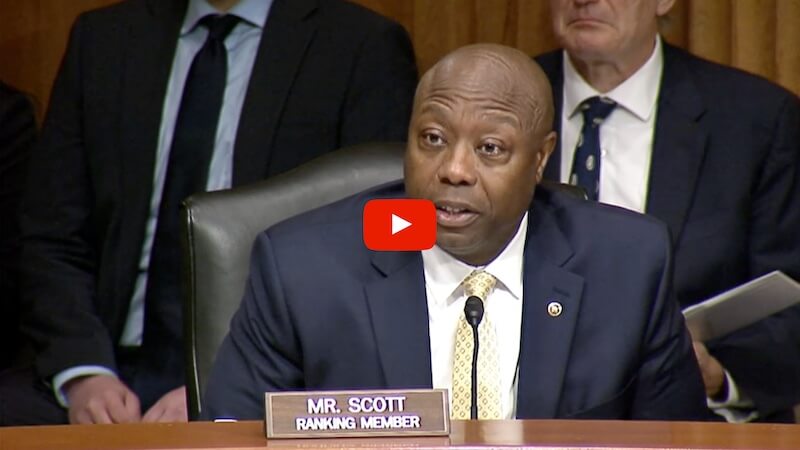Ranking Member Scott Opening Remarks at Hearing on Grandfamilies
WASHINGTON – Today, U.S. Senate Special Committee on Aging Ranking Member Tim Scott (R-S.C.) delivered the following opening remarks at the committee’s hearing titled “Strengthening Support for Grandfamilies during the COVID-19 Pandemic and Beyond.”
Remarks as delivered:
Thank you, Mr. Chairman, for this hearing. And thank you to the witnesses for investing your time and your energy and your expertise in such an important subject.
Grandparents and other relatives raising children save the child welfare system about $4 billion a year in costs related to supports and services for children. Kids raised by kin do better in life than those placed in foster care.
While I was not raised by my grandparents, I certainly had a lot of experience with my grandparents as a youngster. My parents divorced when I was about seven years old. We moved into my grandparents’ house. It was certainly one of the houses that Chairman Casey just described as living at the poverty line or slightly below the poverty line.
The house was filled with lots of love, discipline, and encouragement, but not a lot of resources. So when we think about the importance that grandparents play in the lives of the kids that are in that household, it is undeniable that the child is infinitely better off with the kinfolk, so to speak, than they are in foster care.
We wish we had more of those opportunities in this country today to see those loving kids in foster care, hopefully in loving homes, being in homes where they are related to the ones who are taking care of them. And I thank you all — especially the two grandparents who've had that experience yourselves — for being a part of the panel and having that discussion with us on the important role that that plays in the lives of the grandchildren, but also the important role that the grandchildren play in your lives.
I know that one of the important lessons that I received — most of the important lessons I received in life — some of them came from my academic education, but most of it came from my household. Most of it came from my grandparents and my mother. And I'm so thankful to have had that opportunity to move in with my grandfather, and my grandmother, because he really taught me the value of education and the necessity of perseverance, the necessity of patience, the necessity of hard work, discipline, and frankly, being on time, though I was about 60 seconds late for this hearing. I'm still learning the lessons from my grandfather. He would also agree with that.
But when you think about the households that are at the poverty line in today's economy, where gas is 49 percent higher than it was just several months ago, 100 percent higher than it was 18 months ago, you think to yourself, what are the challenges of raising the second generation of kids too often on fixed incomes?
… Clothing is up over 10 percent, baby food over 13 percent. The scarcity of baby formula [is] without question, a serious challenge for those households who are already at the poverty line trying to meet the needs of their loved ones.
Grandparents raising grandchildren are absolutely a necessity, and we should do everything in our power to provide more light to the problems and more solutions as well.
Back in 2018 I joined our former chairman, Senator Collins, and our current chairman, Senator Casey, in introducing legislation to establish the Supporting Grandparents Raising Grandchildren Advisory Council, which submitted its recommendations to Congress last November.
I join Chairman Casey, as he just said, and Senator Young in taking part of the important implementation through the Informing Grandfamilies Act.
South Carolina is a leader in elevating the role of grandparents raising grandchildren. South Carolina's Department of Social Services (DSS) employs kinship navigators to help these caregivers negotiate the complex web of benefits and supports for which they may be eligible.
DSS has also implemented provisional licensing of kinship caregivers. Provisional licensing makes the kinship caregivers eligible for economic support, otherwise only available to traditional foster parents.
As a result, 21 percent of placements today are to kin caregivers, up from just 5 percent three years ago. That's really good news. To encourage all states to make these kinds of reforms, I have also introduced the Child Care Development Block Grant Reauthorization Act, which would make children in kinship care and parents 65 years or older eligible regardless of income or work requirements.
I look forward to learning as much as possible from the witnesses today, and I thank you for sharing your stories and your expertise as it relates to this very important topic. Mr. Chairman.
###
